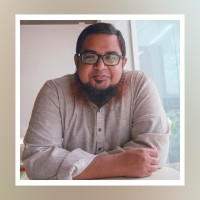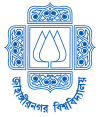
Sayed Abu Touab Shakir Associate Professor, Department of History
PROFILE
SHORT BIOGRAPHY
Sayed Abu Touab Shakir completed his MA in history from Jahangirnagar University. He is currently pursuing his Ph.D. at Jahangirnagar University. He has been serving at the Department of History of Jahangirnagar University since 2006 and is now an Associate Professor there. His area of interest includes social history of Islam, history of Bengal, Islamic education in Bangladesh. He has undertaken several research projects in various research organizations. He has a number of publications in peer reviewed journals and has presented research papers at National and International Seminars and Conferences as well. Besides teaching He has worked in various capacities at Academic Council, students’ advisor at Department of History, member of faculty admission committees and led the administrative team at several students’ dormitories as house tutor and Provost (acting) at Jahangirnagar University.
RESEARCH INTEREST
History of Bengal, History of Madrasha Education in South Asia, River and Economy of Bengal, History of West Asia
JOURNAL PAPER
Sayed Abu Touab Shakir, ASM Mohsin, Mughal Education System in India, The Jahangirnagar Review, Part-C, XXXI, 2020. The advent of the Mughals on Indian soil started a new era in the field of culture and education in 1526. Most of the Mughal Emperors made great contributions to Indian learning and are famous for patronizing different fields of education. Mughal education system was prospective and effective in many ways. Particularly it was secular and also under state purview. Even though the students had to study religious sciences, there were courses on science and arts as well. In the Mughal era, education flourished beyond religion, cast and gender. Especially female members of royal and noble families had the privilege to get educated. Emperors received royal education during their childhood and it influenced the foundation of many imperial educational institutions around this region.https://www.academia.edu/95010652/Mughal_Education_System_in_India
Sayed Abu Touab Shakir, ISLAMIC EDUCATION IN THE EARLY MUSLIM-BANGLA, CLIO, The Journal of Department of History, 2012. Bangla came under the Muslim rule in 1204-1205 A.D. when Muhammad Bakhtyar Khalji defeated Lakshmana Sena, the last Sena king. Bakhtyar Khalji and his successors established the foundation of the Muslim rule in Bangla and the later rulers expended and strengthened it in courses of time. Along side the new administration, grew the new Muslim society. From the very beginning some institutions started to develop to fulfill the intellectual demand of the newly born society. These institutions commonly known as ‘maktab’ and ‘madrasah’ contributed a lot to spread basic knowledge of Islam to the children of the muslim families weather immigrant or converted and thus played a vital role in building up the mentality of Muslim society in the region. The people behind these institutions were Islamic scholars and Sufis mostly immigrants and local or central administrators. The former ran the institutions and some times patronized them while the later only patronized them. The following article is going to focus on the birth of traditional Islamic education in Bangla in very early part of the Muslim rule namely the Sultani period that started from the 1204-05 A.D. and ended in the 1538 A.D. A solid foundation of Muslim society and culture was laid in these three hundred and thirty three years. To understand the basic nature of the Muslim society of Bangla a careful study of the educational system of this period is necessary. From this realization the Sultani period has been selected for this brief article.https://www.academia.edu/40489306/ISLAMIC_EDUCATION_IN_THE_EARLY_MUSLIM_BANGLA
Contact
Sayed Abu Touab Shakir
Associate Professor
Department of History
Jahangirnagar University, Savar, Dhaka-1342, Bangladesh.
Work Phone: +880-2-77911045-51 Extn. 1319-109
Email: shakir@juniv.edu
, shakir.ju@gmail.com

